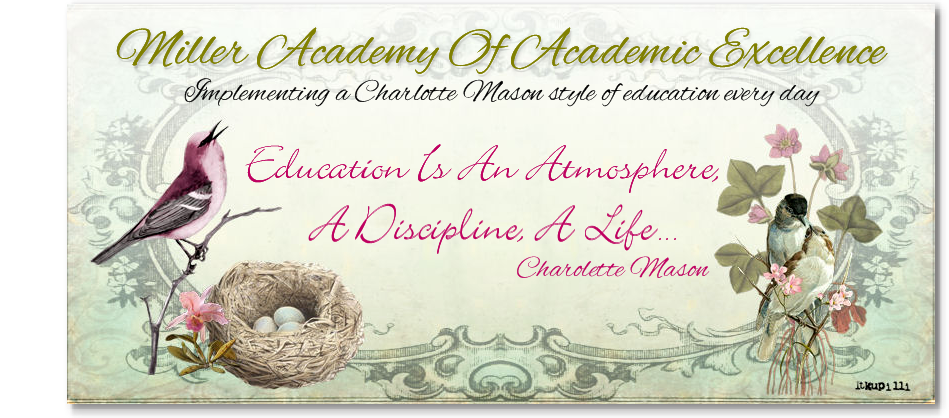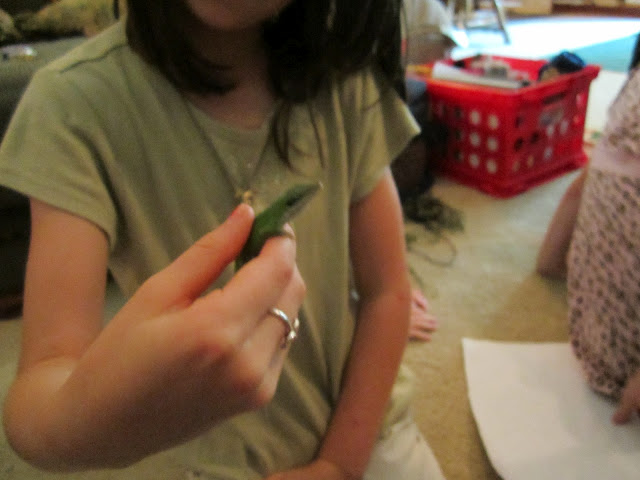"One limitation I did discover in the minds of these little people; my friend insisted that they could not understand English Grammar; I maintained that they could and wrote a little Grammar (still waiting to be prepared for publication!) for the two of seven and eight; but she was right; I was allowed to give the lessons myself with what lucidity and freshness I could command; in vain; the Nominative 'Case' baffled them; their minds rejected the abstract conception just as children reject the notion of writing an "Essay on Happiness." But I was beginning to make discoveries; the second being, that the mind of a child takes or rejects according to its needs.
From this point it was not difficult to go on to the perception that, whether in taking or rejecting, the mind was functioning for its own nourishment; that the mind, in fact, requires sustenance––as does the body, in order that it increase and be strong; but because the mind is not to be measured or weighed but is spiritual, so its sustenance must be spiritual too, must, in fact, be ideas (in the Platonic sense of images). I soon perceived that children were well equipped to deal with ideas, and
that explanations, questionings, amplifications, are unnecessary and wearisome. Children have a natural appetite for knowledge which is informed with thought. They bring imagination, judgment, and the various so-called 'faculties' to bear upon a new idea pretty much as the gastric juices act upon a food ration. This was illuminating but rather startling; the whole intellectual apparatus of the teacher, his power of vivid presentation, apt illustration, able summing up, subtle questioning, all these were hindrances and intervened between children and the right nutriment duly served; this, on the other hand, they received with the sort of avidity and simplicity with which a healthy child eats his dinner." Vol 6 pg 10-11
The years in the Ambleside Online curriculum do not correspond with the grade levels of traditional schooling. The following is an example of some books read in year 4 and their corresponding reading level.
Year 4
Holling: Minn of the Mississippi (6th grade)
Stevenson: Kidnapped (6th grade)
Bober: Abigail Adams: Witness to a Revolution (9th grade)
Bulfinch: Age of Fable (9th grade)
Burnford: Incredible Journey (12th grade)
Defoe: Life and Adventures of Robinson Crusoe (12th grade)
Irving: Legend of Sleepy Hollow (College Junior)
Plutarch's Greek Lives; Stadter version (Graduate Level)
My 9 year old year 4 student will not be able to read these particular books on his own but when they are read to him, as the above quote states, he will take or reject the ideas from these books according to his needs. He will bring his natural appetite for knowledge, imagination and judgement to these books and he will receive the sustenance his mind requires to be healthy.
Complete Year 4 Curriculum
Daily Lessons:
Penmanship or Copywork
Math
Foreign language
Latin
Musical Instrument Practice
Weekly Lessons:
Art Appreciation
Art
Grammar (AO's Language Arts Scope and Sequence for this level is here.)
Correspond history readings with a timeline or century book and map
Handicrafts
Music Appreciation, including folksongs and hymns
Nature Study
One Life from Plutarch
A Shakespeare play
Bible
This site has many versions. [note] x Penny Gardner has a list of Old and New Testament stories to read straight from the Bible that may be useful for Bible time. | Bible timeline | Study questions with nice maps |
History: 1700's up to the French and American Revolutions
This Country of Ours by HE Marshall (purchase) (purchase for Kindle) Charles I-George III [note]
** ***George Washington's World by Genevieve Foster (purchase) 349 pages
OR The Story of Mankind by Hendrick Van Loon (purchase/purchase for Kindle) [note] x
optional supplement: ***An Island Story [note] 1 2 x
Term 1
This Country of Ours (purchase) (purchase for Kindle) [note]
Optional: Story of Mankind by Van Loon [note]
OR A Child's History of the World [note]
Term 2
This Country of Ours (purchase) (purchase for Kindle) [note] (purchase)
George Washington's World by Genevieve Foster (purchase) [note]
OR Story of Mankind by Van Loon [note]
OR A Child's History of the World [note]
Term 3
This Country of Ours (purchase) (purchase for Kindle) [note] (purchase)
George Washington's World by Genevieve Foster (purchase) [note]
OR Story of Mankind by Van Loon [note]
OR A Child's History of the World [note]
optional extra: An Island Story [note]
History Tales and/or Biography
Trial and Triumph by Richard Hannula (purchase/purchase for Kindle) [note]
* Poor Richard by James Daugherty (purchase)
** *** Abigail Adams: Witness to a Revolution by Natalie S. Bober (purchase/purchase for Kindle) (note).
Geography
Minn of the Mississippi by Holling C. Holling (purchase) [note] MR 1 2 BF
Natural History/Science
The Handbook of Nature Study by Anna Botsford Comstock (purchase), as scheduled in Nature Study; online. You may find it helpful and fun to participate in the Outdoor Hour Challenge blog.
Supplies for Nature Study:
Nature notebook and pencils or paint for each student
Begin to build a library of regional field guides
Plenty of time to allow Nature Study to be a fun learning experience for both parent and child
Madam How and Lady Why by Charles Kingsley (purchase for Kindle) (see Study Guide/links by Katie Barr; see also: resources below), first half:
* The Glen, Earthquakes;
** Volcanos, Transformations of a Grain of Soil
*** The Ice-Plough, The True Fairy-Tale, The Chalk Carts
The Storybook of Science by Jean-Henri Fabre (purchase/purchase for Kindle)
Optional: Physics Lab in the Home by Robert Friedhoffer (purchase for Kindle) (search amazon.com) [note]
Those preferring a textbook option may use the Exploring Creation With . . . series by Jeannie Fulbright for science in Years 3-6 (purchase): also available here. A support group is available.
Penmanship/Copywork
A curriculum or program for handwriting is not necessary, but if you want to use one, these are some we've used and can suggest:
A Reason for Writing (Level A: purchase) (Level B: purchase)
Getty Dubay Italic Handwriting Series (purchase)
Mathematics
Select a program that meets your family's needs from our page of Math Options.
Foreign Language
Latin
Poetry
* Alfred Lord Tennyson (purchase for Kindle)
** Emily Dickinson
*** William Wordsworth (purchase for Kindle)
Literature
The Age of Fable by Thomas Bulfinch preface to 14 (Minerva-Niobe) (purchase/purchase for Kindle)
* ** The Life and Adventures of Robinson Crusoe by Daniel Defoe (purchase/purchase for Kindle) [note] Free audio podcast.
** *** Kidnapped by Robert Louis Stevenson (purchase/purchase for Kindle)
*** The Incredible Journey by Sheila Burnford (purchase)
short works (purchase a collection of all of these short works for Kindle):
*** The Legend of Sleepy Hollow by Washington Irving (purchase) (listen to it on librivox.org)
*** Paul Revere's Ride by Henry Wadsworth Longfellow (purchase) (listen to it on librivox; scroll down)
*** Rip Van Winkle by Washington Irving (purchase) (listen to it on librivox.org; scroll down)
Additional Books for Free Reading [note]
Black Beauty by Anna Sewell (purchase) (for Kindle)
Pollyanna by Eleanor Porter (purchase) (for Kindle)
The Secret Garden by Frances Hodgson Burnett (purchase) (for Kindle)
The Railway Children by Edith Nesbit (purchase) (for Kindle)
A Book of Golden Deeds by Charlotte Yonge (purchase)
Bambi by Felix Salten (purchase)
The Chronicles of Narnia series by C.S. Lewis (purchase all in one volume) (purchase boxed set)
The Lion, the Witch and the Wardrobe (purchase for Kindle)
The Magician's Nephew (purchase for Kindle)
The Horse and His Boy (purchase for Kindle)
Prince Caspian (purchase for Kindle)
The Voyage of the Dawn Treader (purchase for Kindle)
The Silver Chair (purchase for Kindle)
The Last Battle (purchase for Kindle)
Little Britches series by Ralph Moody (purchase) (some language; please preview)
The Borrowers by Mary Norton (purchase) (purchase complete Borrowers boxed set) (purchase for Kindle)
Lassie Come Home by Eric Knight (purchase)
Gentle Ben by Walt Morey (purchase)
Gone Away Lake by Elizabeth Enright (purchase)
Thimble Summer by Elizabeth Enright (purchase)
Return To Gone Away by Elizabeth Enright (purchase)
By the Shores of Silver Lake by Laura Ingalls Wilder (purchase)
The Peterkin Papers by Lucretia Hale (purchase); 22 chapters; The Complete Peterkin Papers has a few additional chapters, but each chapter can stand alone. These were originally printed as serials in a magazine.
** Calico Captive (girl interest; purchase/purchase for Kindle) or The Sign of the Beaver (boy interest; purchase/purchase for Kindle) by Elizabeth George Speare
*** Johnny Tremain by Esther Forbes (purchase)
Tree of Freedom by Rebecca Caudill (purchase)
Amos Fortune, Free Man by Elizabeth Yates (purchase)
*** The Reb and the Redcoats by Constance Savery (British view of revolution) (purchase)
Justin Morgan had a Horse by Marguerite Henry (purchase)
See it online at Ambleside's website.




















